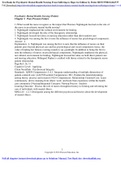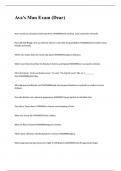Examen
test-bank-for-psychiatric-mental-health-nursing-from-suffering-to-hope-1st-edition-by-potter-ibsn-9780134162737
test-bank-for-psychiatric-mental-health-nursing-from-suffering-to-hope-1st-edition-by-potter-ibsn-2737
test-bank-for-psychiatric-mental-health-nursing-from-suffering-to-hope-1st-edition-by-potter-ibsn-2737
test-bank-for-psychiatric-mental-health-nursing-from-suffering-to-hope-1st-edition-by-potte...
[Montrer plus]
Publié le
12 mars 2023
Nombre de pages
20
Écrit en
2022/2023
Type
Examen
Contient
Questions et réponses
S'abonner
$12.69
Garantie de satisfaction à 100%
Disponible immédiatement après paiement
En ligne et en PDF
Tu n'es attaché à rien
1 Copyright © 2016 Pearson Education, Inc. Psychiatric Mental Health Nursing (Potter) Chapter 2 Past, Present, Future 1) What would the nurse recognize as the impact that Florence Nightingale has had on the role of the nurse in psychiatric-mental health nursing? 1. Nightingale emphasized the cultural environment for healing. 2. Nightingale developed the idea of the therapeutic relationship. 3. Nightingale focused her ideas on nursing education rather than direct patient care. 4. Nightingale was among the first to note the influence of nurses has psychological components. Answer: 4 Explanation: 4. Nightingale was among the first to note that the influence of nurses on their patients goes beyond physical care and has psychological and social components; hence, the value of making her famous evening rounds to say goodnight. In addition to being the first to note the influence of nurses on psychological components, Nightingale emphasize the physical, not cultural, environment for healing. Nightingale focused her ideas on both direct patient care and nursing education. Hildegard Peplau is credited with theory related to the therapeutic nurse-





